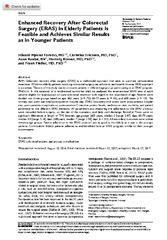Enhanced Recovery After Colorectal Surgery (ERAS) in Elderly Patients Is Feasible and Achieves Similar Results as in Younger Patients
Peer reviewed, Journal article
Published version

Åpne
Permanent lenke
https://hdl.handle.net/1956/17111Utgivelsesdato
2017Metadata
Vis full innførselSamlinger
Originalversjon
https://doi.org/10.1177/2333721417706299Sammendrag
Aim: Enhanced recovery after surgery (ERAS) is a multimodal approach that aims to optimize perioperative treatment. Whether elderly patients receiving colorectal surgery can adhere to and benefit from an ERAS approach is uncertain. The aim of this study was to compare patients in different age groups participating in an ERAS program. Method: In this substudy of a randomized controlled trial, we analyzed the interventional ERAS arm of adult patients eligible for laparoscopic or open colorectal resection with regard to the importance of age. Patients were divided into three groups based on age: ≤65 years (n = 79), 66-79 years (n = 56), and ≥80 years (n = 19). The primary end point was total postoperative hospital stay (THS). Secondary end points were postoperative hospital stay, postoperative complications, postoperative C-reactive protein levels, readmission rate, mortality, and patient adherence to the different ERAS elements. All parameters and measuring the adherence to the ERAS protocol were recorded before surgery, on the day of the operation, and daily until discharge. Results: There were no significant differences in length of THS between age groups (≤65 years, median 5 [range 2-47] days; 66-79 years, median 5.5 [range 2-36] days; ≥80 years, median 7 [range 3-50] days; p = .53). All secondary outcomes were similar between age groups. Patient adherence to the ERAS protocol was as good in the elderly as it was in the younger patients. Conclusion: Elderly patients adhered to and benefited from an ERAS program, similar to their younger counterparts.
